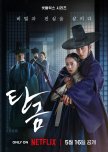"Dear Hongrang": A Gorgeous Mess of Myths, Murder, and Missed Opportunities
*Dear Hongrang* is a visually elegant historical K-drama that ambitiously blends elements of romance, mystery, psychological tension, and political intrigue. At its best, it creates a haunting atmosphere with stylized visuals, strong performances, and an intriguing setup. However, despite its rich themes and dramatic potential, the series ultimately falters under weak execution and a reluctance to embrace the darkness it flirts with.
The drama begins with a compelling premise involving a long-missing family member, layered court secrets, and a growing sense of danger tied to royal corruption. Alongside this is a slowly developing romantic thread between the two main leads, whose emotional bond is evident but arrives late and feels rushed. The chemistry is there, and in moments it works beautifully, but the love story often feels like it's competing with — rather than complementing — the show's more sinister core.
Narratively, *Dear Hongrang* struggles with tonal consistency. It introduces disturbing and powerful themes — including systemic abuse and loss of identity — but repeatedly pulls back just as it reaches the edge of real emotional or thematic impact. This hesitation leaves the story feeling sanitized, especially in scenes that clearly gesture toward deeper psychological or physical trauma but avoid confronting it directly. The result is a show that promises more than it delivers.
In terms of character development, the drama shines most with its antagonist and supporting roles. One of the most compelling character arcs belongs to the second male lead, who gradually shifts from a loyal protector to something far more complicated. His transformation feels earned and is one of the few emotionally satisfying elements of the series. Meanwhile, the central female lead starts off with purpose and strength but is eventually reduced to a more passive, reactionary role. Despite her emotional depth, she rarely influences the plot in meaningful ways.
The family dynamics, particularly within the Sim and Min households, are introduced with intensity but left underexplored. Motivations for key conflicts remain vague, and several major character resolutions — while fitting — feel unearned due to lack of buildup. Subplots like secret organizations, cave-dwelling allies, and personal vendettas are briefly touched on and then discarded without proper closure.
That said, the technical achievements of *Dear Hongrang* are undeniable. The cinematography is striking, especially in low-light sequences. Lighting and staging are used effectively to create a moody, immersive world. The action scenes, while sometimes theatrical, are choreographed with flair and confidence. Sound design is another highlight, with atmospheric music and tension-building silence used to full effect. The only letdown in production design is the costume work, which often feels too safe and underwhelming for a historical series of this scale.
In the end, *Dear Hongrang* is a show full of potential — one that sets the stage for something powerful and dark, only to back away from its own narrative risks. It’s haunting to look at and momentarily engaging, but ultimately leaves you wishing it had gone further, deeper, and bolder.
Thanks for reading ✨️
Was this review helpful to you?










